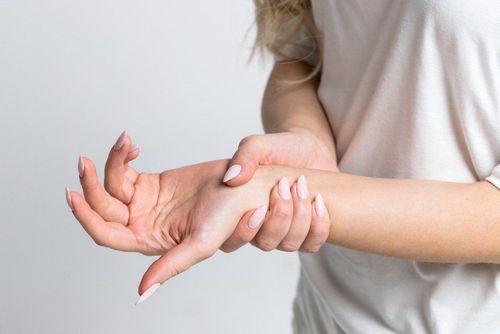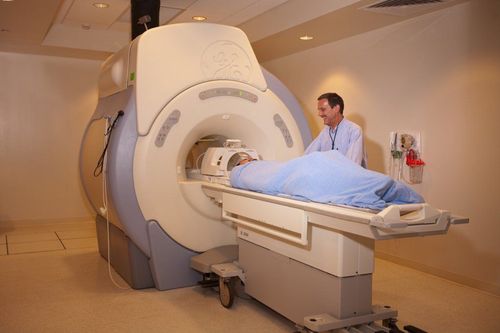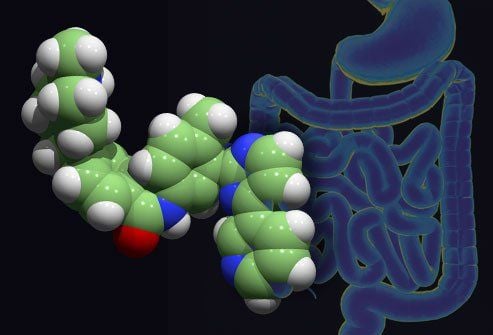This is an automatically translated article.
Peripheral neuralgia is a sign of pathology caused by damage to the peripheral nerves. The pain causes the patient to face limitations in activities.1. What is Peripheral Nerve Pain?
Peripheral neuralgia is a symptom of peripheral neuropathy, caused by damage to the peripheral nerves. The peripheral nervous system includes sensory, motor, and vegetative peripheral nerve fibers. Peripheral nerves help transmit signals from the brain and spinal cord to target organs, but they are very thin and easily damaged. When the peripheral nerves are damaged, it disrupts the brain's ability to exchange information with muscles and other organs.
Signs of peripheral nerve pain are the result of trauma, metabolic disease, infection, genetics or exposure to toxic chemicals. These causes cause each nerve to be destroyed, leading to manifestations of motor, sensory and vegetative disorders.
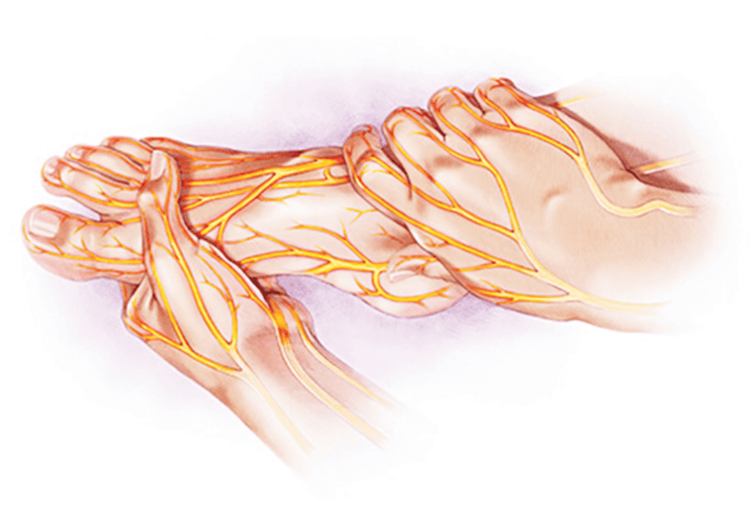
Dây thần kinh ngoại biên
2. Symptoms
Signs of peripheral nerve pain indicate peripheral nerve damage. In addition, some other signs of peripheral neuropathy that the patient may feel include:
2.1 Tingling in the legs or feet The first symptom of peripheral neuropathy usually occurs with tactile. The patient's limbs will feel tingling, hot, and itchy like ants. This sensation will first appear in the toes and feet, and may even extend to the ankles or legs. When the tingling sensation spreads up to the knee, the risk of the patient's hand will also be affected.
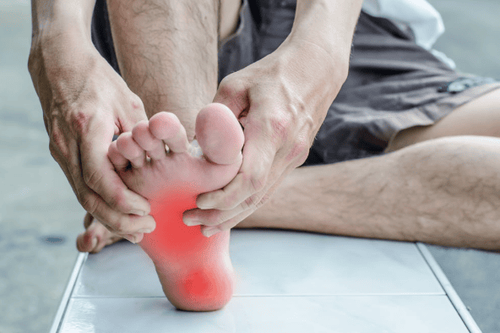
Tình trạng ngứa ở bàn chân
2.2 Pain and Numbness Pain and numbness often occur in the feet and legs. The patient may even lose feeling in the legs and arms, unable to feel heat and cold. This leaves the patient vulnerable to injury.
Numbness makes it difficult for the patient to perceive the movement of the legs, leading to loss of balance. Because the brain cannot locate position and posture in space. The reason is that some axons will randomly send information from nerve impulses, causing the brain to send out tingling and pain signals, some other axons cannot transmit information to them. brain, causing numbness.
2.3 Dizziness The patient may experience a postural drop in blood pressure when standing up suddenly, then rise again slightly higher than normal. In addition, the nerves can also cause the arteries to narrow, making the heart beat faster, blood pressure increases.
Due to damaged nerves, if this mechanism is not strong enough to increase blood pressure and pump enough blood to the brain, under the effect of gravity, blood will be pulled more towards the legs. Therefore, patients with peripheral neuropathy will often have problems with the central nervous system, feel mild dizziness when changing positions, more intense can cause fainting.

Triệu chứng chóng mặt
2.4 Muscle problems Damage to the nerves causes the nerve axes to not be enough to stimulate the cells, the muscles have difficulty and cause muscle weakness. The most obvious manifestation is that the patient finds it difficult to stand on tiptoes or stand on heels. As the disease progresses, the patient may not be able to grasp objects.
2.5 Cardiovascular and digestive problems Problems digesting food: feeling full and heartburn, when eating small amounts of food. Sometimes vomiting when food has not been digested. Cardiovascular problems: If the nerves in the heart are damaged, the person may feel light-headed or faint when standing up. Angina is a warning sign of heart disease and a heart attack. Nerve damage in the heart can be confused with cardiovascular disease. Therefore, patients need to watch for other heart attack warning signs such as sudden fatigue, shortness of breath, nausea, vomiting, and sweating.
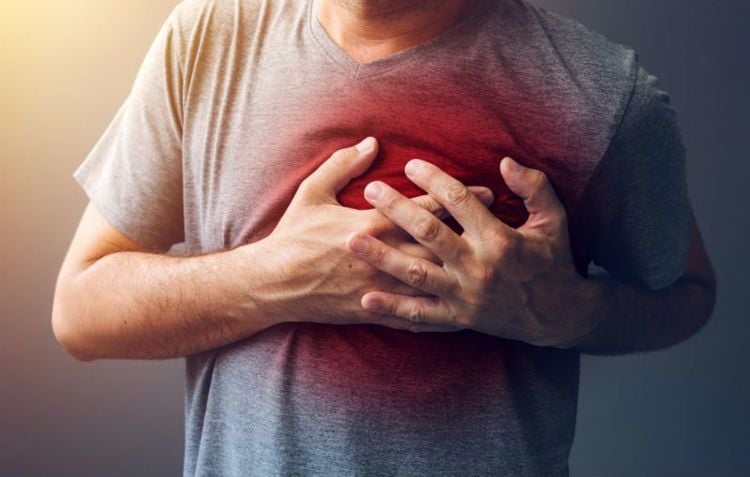
Người bệnh xuất hiện cơn đau thắt ngực
2.6 Other symptoms Dry mouth: less saliva production, the mouth will be dry when the nerves are not working properly. This causes discomfort and problems with swallowing and tooth decay as bacteria thrive. Dry eyes: cause discomfort and increase the risk of corneal abrasions, eye infections. Sexual problems: Women may experience vaginal dryness or difficulty reaching orgasm, while men may experience erectile dysfunction. Bladder: Loss of feeling of needing to urinate, leading to urine leakage. Sweating: sweating too little or too much, disrupting body temperature control.
3. Causes of Peripheral Nerve Pain
There are many causes of peripheral nerve pain, including:
Trauma: direct pressure on the nerve Metabolism: diabetes, vitamin B deficiency, malnutrition, and porphyria. Inflammation such as: lupus, polyarteritis, multiple sclerosis, Sjogren's syndrome, acute and chronic demyelinating polyneuropathy... Infections: herpes virus, varicella virus causing postherpetic neuralgia, HIV /AIDS, Lyme disease, leprosy and syphilis. Nerve cancer is rare, but it can also cause peripheral nerve pain. Other causes of neuropathy include: stimulants such as alcohol, use of isoniazid, metronidazole, chemotherapy and heavy metals. In addition, a family history of peripheral neuropathy is a risk factor that increases the likelihood of peripheral neuropathy.
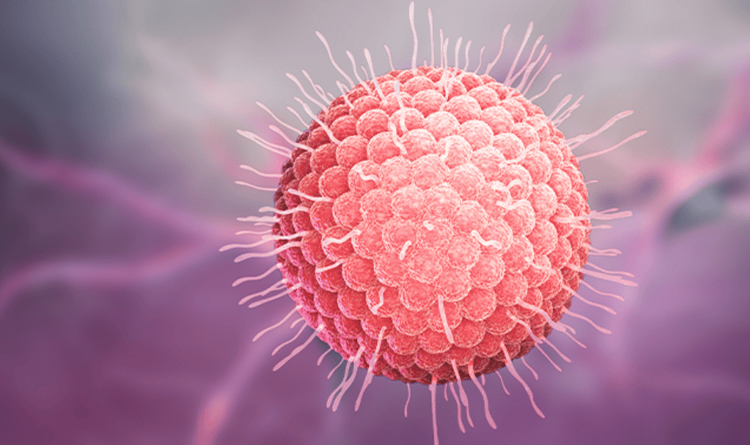
Virus herpes gây nhiễm trùng
4. Diagnosis of peripheral neuralgia
When there are signs of peripheral nerve pain, to diagnose peripheral neuropathy, the doctor will make a preliminary assessment based on the history and physical examination. In addition, the patient may need another test to confirm the diagnosis and find the cause such as:
Magnetic resonance imaging (MRI) of the brain and spinal cord Nerve conduction study Electromyography ( EMG) Nerve Biopsy Lumbar puncture
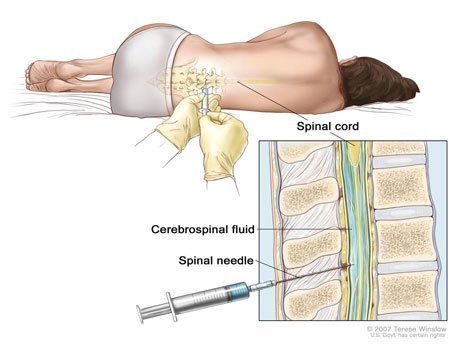
Chọc dò tuỷ sống thắt lưng
5. Treatment of peripheral nerve pain
To treat peripheral nerve pain, your doctor will use temporary pain relief. However, for definitive treatment, it is necessary to treat the cause:
Diabetes: Good blood sugar control can reduce the risk of peripheral neuropathy Alcoholism: make a habit of giving up alcohol Vitamin B12 deficiency: supplement Vitamin supplements Drugs to treat pain caused by peripheral neuropathy are used together such as:
Antidepressants Antiepileptic Anesthesia

Điều trị đau dây thần kinh ngoại biên bằng thuốc
Physiotherapy will be especially useful for patients with chronic neck and low back pain. Acupuncture and biofeedback. Surgery and nerve blockade are the main options for people with spinal cord injuries. Surgery is often performed when other treatments have not worked. The sign of peripheral nerve pain is a sign of a certain peripheral neuropathy, causing damage to the nerves. The disease causes the patient pain and discomfort in daily life. Moreover, it also leaves unpredictable side effects. Therefore, when you see abnormal symptoms, it is necessary to immediately go to a medical facility for timely examination and treatment.
Peripheral neuropathy can have a negative impact on life if steps are not taken to treat and prevent worsening of symptoms. Finding the right treatment options can take time, but patients and doctors can work together to reduce symptoms of the condition.
Peripheral neuralgia can leave many complications for sufferers, so the examination and detection of neuropathic pain is very important. Currently, Vinmec is implementing a lot of periodic health checkup packages suitable for each age, gender and individual needs of customers with a very preferential price policy. The advantage of Vinmec's health check-up packages is that customers will be screened and screened by a system of modern equipment to help support the best diagnosis today such as PET/CT, MRI, CT 640 machines. , the world's leading advanced ultrasound machine system, international standard laboratory system,... After a general examination, if any diseases are detected, customers can use services from specialists other departments at the hospital with outstanding quality of treatment.




